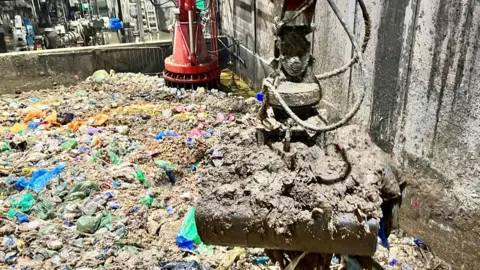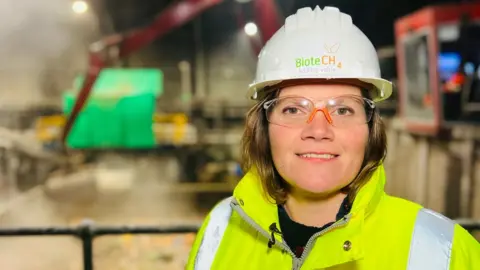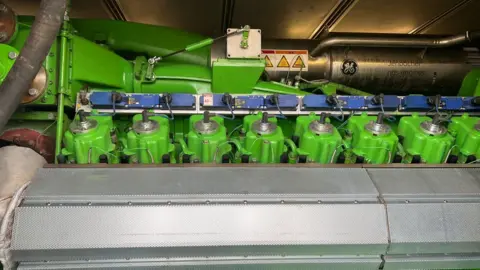Christmas food waste to power thousands of homes
 Linsey Smith/BBC
Linsey Smith/BBCA food recycling firm has said it will generate enough power to fuel 10,000 homes using the additional food waste generated this Christmas.
BioteCH4, based at Hemswell in Lincolnshire, turns waste food into renewable energy and fertiliser.
Over Christmas 2022, the site received 90,000 tonnes of additional waste - a 7.5% increase on regular volumes - a spokesperson said.
Climate campaign group WRAP said it was a "disaster" so much was thrown away.
The waste recycled by the firm at the site near Gainsborough came from homes via council waste collection trucks, businesses, supermarkets and manufacturers, BioteCH4 said.
At the site, the waste was mixed and fed through an anaerobic digestor, which produced energy to power homes.
 Linsey Smith/BBC
Linsey Smith/BBCMatt Vallance, site manager, said it was equipped to cope with the extra food waste produced over the festive season.
"The supermarket providers, they are obviously putting a lot more food onto the shelves," he said.
"The site has been built well enough that we have the capacity to handle it."
Pamela Woolcock, from BioteCH4, said the company had been working with charities to encourage people to only buy what they needed.
The equivalent of four million Christmas dinners were thrown away every year, she said.
"That's seven million mince pies or 12 million roast potatoes," she added.
"The average household spends about an extra £100 [on food] at Christmas, of which it is estimated £16 worth goes straight in the bin."
 Linsey Smith/BBC
Linsey Smith/BBCCatherine David, from campaign group WRAP, said the majority of food waste came from homes and was preventable.
"It is a disaster really that so much good food is going in the bin," she said.
Ms David said research by WRAP, which wants to cut the amount of food waste and change the way food is produced and consumed, showed the average family of four spent £1,000 a year on food which was then discarded.
Ms David said her advice to people wanting to cut their food waste was that "your freezer is your friend".
Both poultry and potatoes, some of the most wasted food in the UK, could be frozen and enjoyed weeks later, she said.

Follow BBC East Yorkshire and Lincolnshire on Facebook, X (formerly Twitter), and Instagram. Send your story ideas to [email protected]
